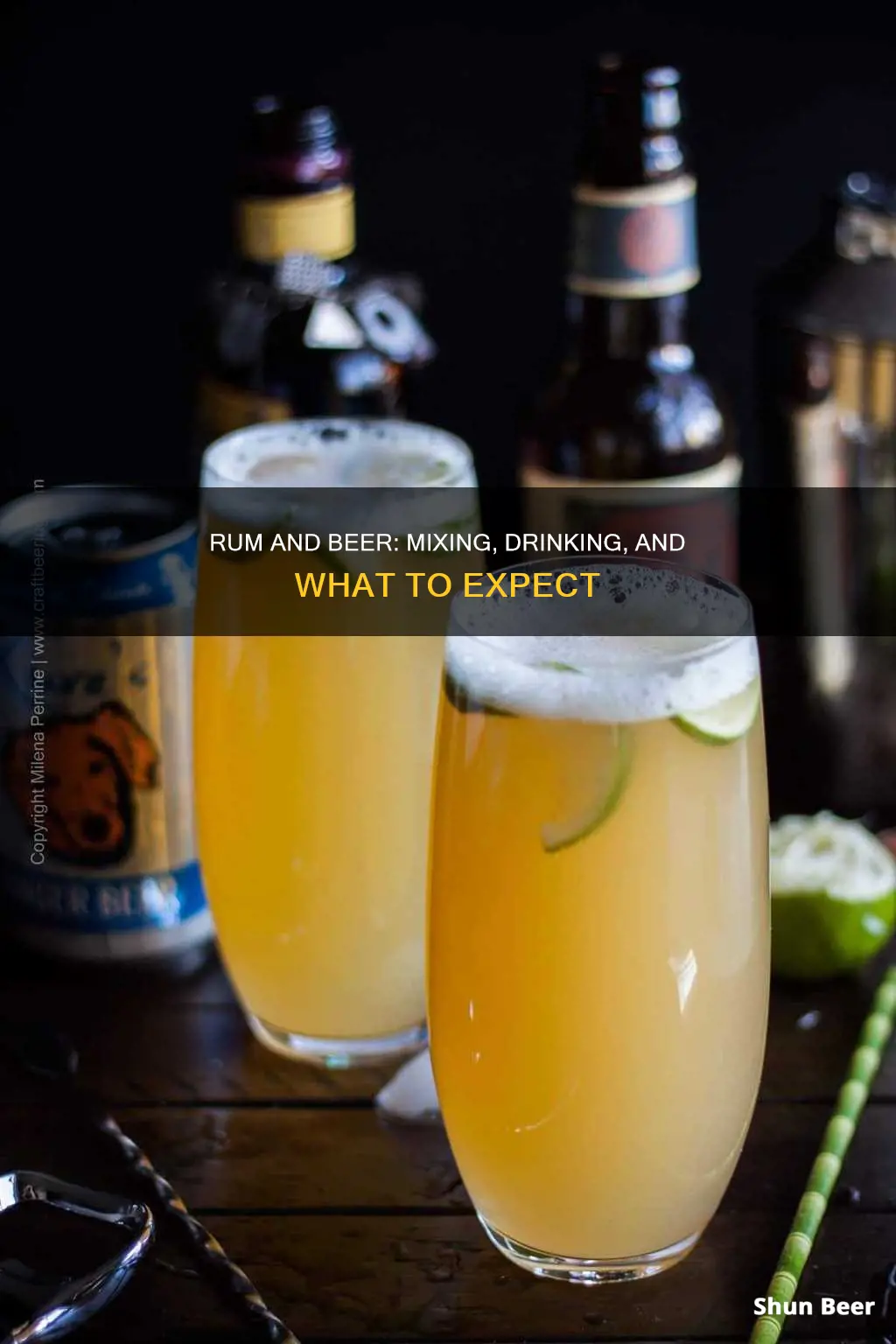
There are many theories and myths surrounding alcohol consumption, and one of the most well-known is the saying, Beer before liquor, never been sicker; liquor before beer, you're in the clear. This phrase suggests that drinking beer before liquor will result in a worse hangover or an unpleasant drinking experience. However, the order in which you consume alcoholic beverages has little impact on the severity of a hangover. This myth likely stems from the idea that liquor has a higher alcohol content and can spike your blood alcohol levels more quickly, but starting with liquor does not protect against a hangover. The amount of alcohol consumed, the presence of food, genetics, and other factors play a more significant role in determining the severity of a hangover.
| Characteristics | Values |
|---|---|
| Can drinking beer before liquor make you sicker? | No |
| Can drinking liquor before beer make you feel better? | No |
| What factors contribute to a hangover? | Amount of alcohol consumed, drinking on an empty stomach, frequency of drinking, genetics, congeners, smoking |
What You'll Learn

Drinking order does not affect hangovers
There are many theories about drinking orders and their effects on hangovers. One common saying is "beer before liquor, never been sicker; liquor before beer, you're in the clear." This suggests that drinking beer before liquor will make a hangover worse. This saying is based on the idea that liquor has a higher alcohol content and is more likely to spike your blood alcohol levels quickly. However, the order in which you consume your drinks is unlikely to influence whether you experience a hangover the following day.
Alcohol starts being absorbed into your bloodstream as soon as it reaches your stomach. So, regardless of drinking order, all the alcohol you consumed will have been absorbed before your hangover sets in. As long as the total amount of alcohol consumed remains the same, drinking order will not affect the severity of your hangover. However, if a particular drinking order consistently leads you to consume larger amounts of alcohol, it may increase the likelihood of a hangover.
Several factors can affect your risk of experiencing a hangover. The amount of alcohol you drink is one of the most significant factors. Higher blood alcohol levels are more likely to induce a hangover. Whether you have eaten before drinking is another factor. Drinking on an empty stomach causes alcohol to move quickly from your stomach to your intestines, where it can be absorbed more rapidly, leading to higher blood alcohol levels.
How frequently you drink also matters. Heavy drinkers are more likely to reach blood alcohol concentration levels that lead to hangovers. Additionally, genetics plays a role. Your genes influence how your body metabolizes alcohol, which can impact the effects of alcohol on sleep, hydration, blood sugar levels, and blood vessel dilation—all factors that contribute to hangover severity.
In summary, while there are many myths and theories about drinking orders and hangovers, the order in which you consume alcoholic beverages is not a significant factor in determining whether you will experience a hangover. The total amount of alcohol consumed and other factors, such as eating before drinking and drinking frequency, have a much more substantial influence on hangover severity.
Beer and Conception: What You Need to Know
You may want to see also

Total alcohol consumed matters, not the type
The idea that drinking beer before liquor can make you sick is a common misconception. The order in which you consume your drinks is unlikely to influence whether you experience a hangover or not. The total amount of alcohol consumed is the key factor in determining the severity of a hangover.
Alcohol is absorbed into the bloodstream as soon as it reaches the stomach, and by the time a hangover sets in, all the alcohol consumed has already been absorbed. Therefore, the order of drinks does not matter as long as the total amount of alcohol consumed remains the same.
For example, if drinking rum after beer consistently leads to consuming larger amounts of alcohol, it may be more likely to cause a hangover. However, if the total amount of alcohol consumed is the same, there is no reason why drinking rum after beer would increase the risk of a hangover compared to drinking beer before rum.
Pacing is crucial to avoiding hangovers and other negative effects of drinking. No matter the type of alcohol, drinking too much, too quickly can lead to negative consequences. It is important to remember that drinking liquor before beer or vice versa will not protect against a hangover; the total amount of alcohol consumed is what matters.
Drinking Beer on a Boat: Ontario's Laws
You may want to see also

Carbonated drinks irritate the stomach lining
Whether you're drinking beer or rum, carbonated drinks can irritate the stomach lining.
Carbonated drinks are known to cause digestive issues like stomach pain, bloating, and gas. The carbonation in these drinks introduces air into the stomach, similar to eating or drinking too fast. This can lead to increased gastric volume and feelings of fullness, bloating, nausea, or discomfort. The pain receptors in the body may also detect carbonation as pain.
Additionally, carbonated drinks can alter the pH levels in the body and affect stomach acid. They can add air and pressure to the stomach and intestines, which can be problematic for those with acid reflux or GERD. The acidity of carbonated drinks, with a pH between 2.32 and 5.24, can be harmful to some people.
The effects of carbonation on the stomach appear to be related to both mechanical and chemical effects. Symptoms of gastric mechanical distress typically only occur when consuming more than 300 ml of a carbonated fluid.
While the order of drinking beer and rum may not affect whether you experience a hangover, other factors do, such as the amount of alcohol consumed, whether you have an empty stomach, how frequently you drink, genetics, and smoking.
Beer Tower Tech: Glycol Cooling Explained
You may want to see also

Alcohol affects men and women differently
While the saying goes, "beer before liquor, never been sicker; liquor before beer, you're in the clear," there is little scientific evidence to support this. The order in which you consume your drinks is unlikely to influence whether you experience a hangover the next day. Instead, the total amount of alcohol consumed is a more significant factor.
That being said, alcohol does affect men and women differently. Women tend to be more susceptible to the effects of alcohol than men. This is because women's bodies contain proportionately less water and more fat than men's bodies. Water dilutes alcohol, while fat retains it, resulting in women's organs being exposed to higher concentrations of alcohol for longer. Additionally, women have lower levels of alcohol dehydrogenase, an enzyme that breaks down alcohol before it reaches the bloodstream. As a result, women's blood alcohol levels are higher than men's, even when body weight is taken into account. This means that one drink for a woman is roughly equivalent to two drinks for a man.
The differences in how alcohol affects men and women go beyond just the immediate effects of drinking. Women are at greater risk than men for alcohol-induced hangovers, liver inflammation, cardiovascular disease, and certain cancers. Research also suggests that women have a faster progression of alcohol use disorder and are more likely to drink to cope with anxiety and depression.
Cultural and social factors also play a role in the gender differences in alcohol consumption. Historically, alcohol consumption has been a male-dominated activity, with men consuming more alcohol and experiencing more alcohol-related harms. However, the gender gap is narrowing, with alcohol use among men declining more than among women.
Bravo Capsule and Beer: A Safe Mix?
You may want to see also

Pacing and moderation are key
Drinking too much alcohol, regardless of the type or order, can lead to negative consequences such as hangovers, impaired judgment, and health risks. To avoid these issues, it is important to practice pacing and moderation when drinking. This means being mindful of the amount of alcohol you consume and the rate at which you consume it.
- Set a limit for how many drinks you will have and stick to it.
- Alternate alcoholic beverages with water.
- Drink lower-calorie and lower-alcohol options, such as a 5-6% ABV beer.
- Avoid mixing alcohol with energy drinks or diet soda, as they can alter your perception of intoxication and increase alcohol absorption.
- Eat before and while drinking to slow the absorption of alcohol and reduce the risk of acid reflux.
- Be aware of your limits and listen to your body. Stop drinking if you feel too intoxicated.
- Avoid drinking games or challenges that encourage excessive consumption.
By following these tips and being mindful of your consumption, you can enjoy drinking beer and rum without experiencing negative consequences. Remember, it is not the specific type or order of drinks that matters, but rather your overall consumption and pacing.
Lovastatin and Beer: A Safe Mix?
You may want to see also
Frequently asked questions
Yes, you can drink rum after beer. The order in which you drink alcohol does not matter. What matters is how much you drink and how quickly you drink it.
No, drinking beer before liquor will not make you sicker. The severity of a hangover depends on the amount of alcohol consumed and the time taken to consume it.
The best way to avoid a hangover is to pace yourself, drink in moderation, and alternate alcoholic drinks with water.







